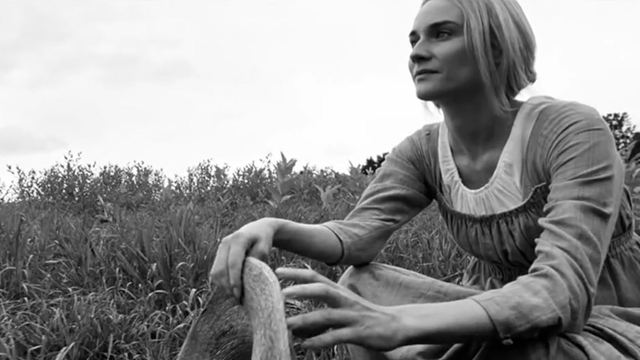Much is known about the young Abe Lincoln, as this reviewer spent a few days in his childhood at Indiana's Lincoln State Park, taking in tours and amphitheater shows about the titular attraction's frontier days. Edwards appears to have done his homework in a film that has the feel of authenticity. Whether young Abe is the subject or no, this film would work as an interesting portrait of rustic, 19th century living. The family lives in a cabin in the woods, and Abe being Abe, many logs are split. The Malick-ian influence again comes out in the opportunities to shirk duties, with swimming or reading in fields or wrestling, most taking place at magic hour. There's also a more contemporary feel in the merging of two families that occurs around the halfway point, as everyone recalibrates themselves to new presences. Abe's sister, formerly withdrawn, opens herself up to her stepmother, while Abe's father is happy to get a stepson more interested in manly pursuits than his bookish biological son. The Better Angels merges eras in this fashion, a potentially modern tale in a period setting.
In the lead role as Abe, Braydon Denney is well-cast for his pensive look. He doesn't have a lot of lines in a largely internal performance, more of an observer at this age than a doer, and Denney has the ability to make long looks appear meaningful. As his mother, Marling isn't really stretching herself as a semi-spacey, whimsical presence, but as Abe's step-mother, Kruger turns over new cards from her often-frosty film persona. Here, she's the perfect mother, tentatively warm to her initially standoffish stepson, then protective of him against his father's anger, and ultimately his greatest advocate. As Abe's father, Jason Clarke is hard, but not too hard, making moments of vulnerability and affection that much more powerful. He's a man who can picture the rest of his life without great difficulty, and could use that knowledge as a source of resentment or of pride towards his son. Clarke plays the character with enough openness that this is never really a question.
The Better Angels easily won me over. Lincoln's an endlessly fascinating figure, and the more cinematic representations, the better. Characters in The Better Angels are often talking about Abe's potential to be great, but the viewer ultimately knows what's going to happen to him. This might seem like a negative, like the characters have meta knowledge that their son or brother is destined for significance, but Edwards never gets too cute. The actors are earnest enough that those assertions come off as optimism and hopefulness instead of a winking prophecy. How often do parents anywhere have those same conversations? The Better Angels reminds that no one ever made it on their own, even someone as gifted as the greatest president in US history. B+

 RSS Feed
RSS Feed